You’ve come to the right place if you’re one of those innovative spirits itching to make their online business ideas a reality. The right business idea is the first step; the next is launching those dreams into a lived reality.
It’s a great time to be an entrepreneur, especially with the boom of online business models and eCommerce. The main challenge lies in identifying your strengths and interests to convert to an online business that fills a real gap in the market today.
According to Statista, the US online business and eCommerce market is expected to grow by 53.7% between 2025 and 2029! The rise of eCommerce has leveled the playing field for new entrepreneurs like never before in US history. Here are some handy statistics.
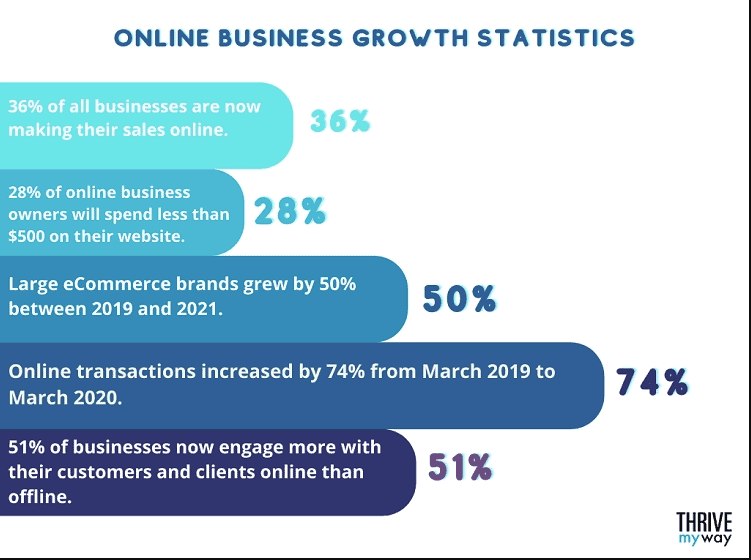
In today’s post-pandemic world, it has become crucial for businesses to stay on top of digital trends to remain relevant and top-of-mind to consumers. According to studies by Gartner, 91% of businesses already engage in digital initiatives. Also, about 89% of companies have already adopted a digital-first business strategy.
So, we’ve curated a handy guide to some diverse and profitable online business ideas for aspiring entrepreneurs. We’ll also highlight some trends that will play a big role for online businesses in 2025 and beyond. Let’s dive right in.
Table of Contents
Key Takeaways
- Some of the crucial trends for online businesses in 2025 are the rise of eCommerce, the increased importance of digital and content creation, and the popularity of short-form video content on social channels.
- Dropshipping, print-on-demand, and handmade goods stores are lucrative and in-demand online business ideas in eCommerce and product-based industries.
- Service-based online business ideas, such as freelance services, virtual assistance, and online coaching and consulting, are emerging as profitable ventures in 2025.
- Blogging, YouTube content creation, and podcasting are the most influential online business ideas in the digital marketing realm for 2025.
- With the help of emerging business innovations like AR/VR content, AI-powered content generation, and sustainability, brands can stay on top of upcoming trends well into the future. Remember, companies that plan stay ahead.
Understanding the Online Business Landscape
Before exploring the inspiring ideas, let’s review the online business landscape in 2025. What are the trends you need to watch out for? And what are the benefits of starting an online business versus a traditional retail store in 2025?
Let’s find out.
Key Online Business Trends in 2025
The online business landscape in 2025 is evolving rapidly. Here are a few trends to watch out for as you prepare to launch your online business.
1. eCommerce is expected to grow rapidly
The pandemic enabled the growth of eCommerce services in our economy, as before. At the very least, even traditional offline retailers have started switching to an eCommerce or hybrid model. This trend is expected to continue. In 2022, eCommerce accounted for one-fifth of the total global retail sales; we don’t see this trend going backward soon.
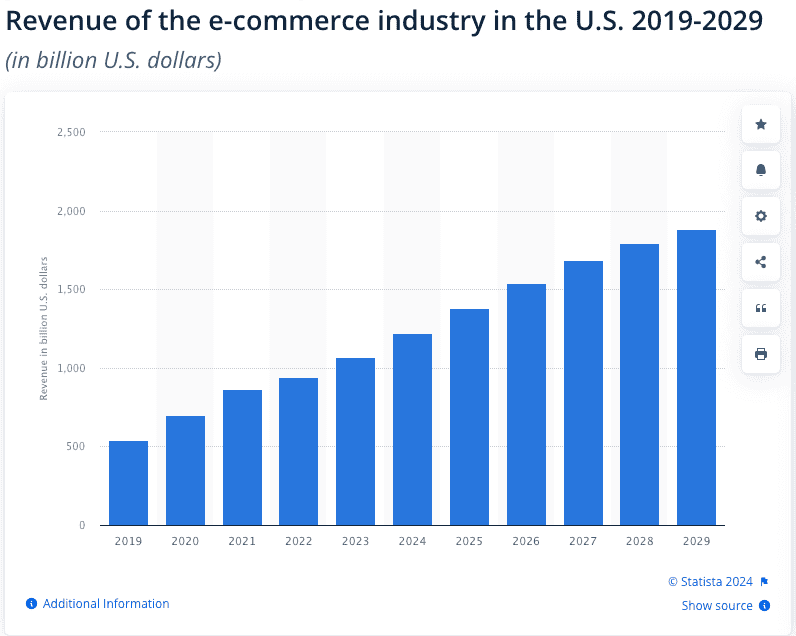
Within the eCommerce market, there’s a marked shift towards intuitive eCommerce. What does this mean? Consumer expectations are evolving rapidly, and they are increasingly demanding one-of-a-kind shopping experiences. This includes personalized product recommendations and a better customer experience from beginning to end.
But, with the right tools and analysis, it is not too difficult for companies to meet the evolving demands of tech-savvy customers.
2. Content creation and digital marketing is crucial for success
Well into 2025 and beyond, content creation and digital marketing strategies will continue to play an important role.
The right content marketing strategy will attract, engage, and retain your audience by publishing relevant articles, white papers, videos, podcasts, infographics, and podcasts. Here, the strategy is to allow the right audience to find you through organic search rather than pushing your marketing calls on an audience.
The best way is to establish yourself as a leader in your field and gain credibility over time by adding genuine value to your audience. Here’s one of the best retail eCommerce blogs in the market today for inspiration.

Another trend is the continued rise of digital marketing. It includes display ads, search engine marketing, paid social media ads, podcasts, and more. Content creation forms one part of digital marketing.
Some of the most popular digital marketing assets in 2025 include blog posts, long and short-form videos, infographics, case studies, and white papers.
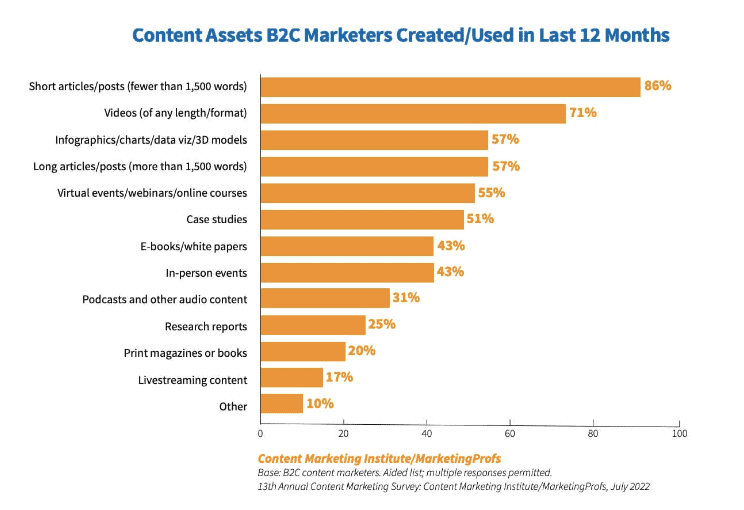
3. Short-form videos and social channels will play a crucial role
A short-form video is video content less than 30-90 seconds long. This has emerged as a key area where organic videos can boost demand for a product. While longer videos can go in-depth into products and services, short-form videos can give quick explainers or benefits of a product or service.
According to recent surveys, 91% of customers prefer short-form content. The algorithms also give short-form content an added advantage on social channels like Instagram and TikTok. An average user spends 41 minutes daily on TikTok, so it’s a great way to grab attention.
These videos are relatively easier to create. The hack is to create a compelling narrative that resonates emotionally with your target audience. You can leverage the power of short-form videos to create product introductions, behind-the-scenes content, and user-generated content.
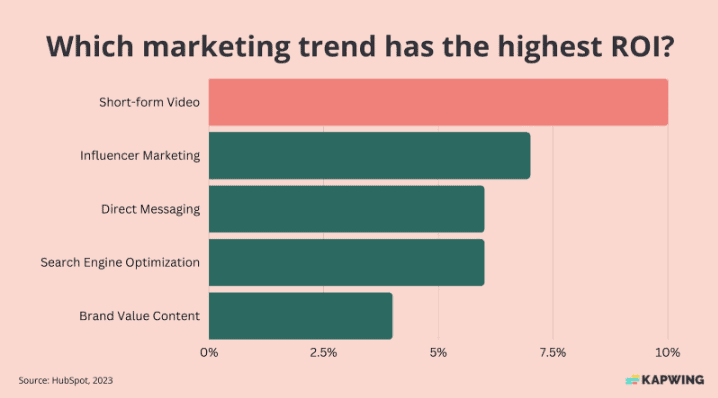
But don’t be intimidated by any of these trends. Once you get started, you’ll find ways to stand out from your competitors, and these trends will become quite familiar and exciting.
Why start an online business in 2025?
So, let’s look at some key reasons to launch your business online in 2025. You’ll be surprised that the pros far outweigh the cons regarding online business in this decade. Here’s why we recommend an online business.
- Increased flexibility and low start-up costs: If you don’t want to quit your full-time job to start a business, online businesses afford you the flexibility. You won’t be confined to fixed working hours, so long as you hustle in the time you do have. Also, start-up costs are much lower than those of traditional brick-and-mortar stores.
- Global market reach from the get-go: With an online business, you’re not confined to a particular geographic area. As soon as you launch your business, you can go national or even global.
- Increased scalability: Compared to scaling up a physical store or service outlet, online businesses are easier to scale as your business grows. You’ll spend significantly less effort and energy in the long run.
- Access to customer data and analytics: With an online business, you’ll have ready and easy access to all your customer data in one place. This lets you track past behavior and future trends in real time to make data-driven decisions at the right time.
- Environment-friendly: An online business is far more eco-friendly and tends to have a lower carbon footprint than traditional stores.
- Increased customer flexibility: Customers can shop at their convenience and enjoy flexible payment methods and quick deliveries.
Read also: 25+ eCommerce Marketing Tools to Boost Sales in 2025
9 Top Online Business Ideas for 2025
Ready to begin your research on some diverse and profitable business ideas sure to take off this year? We’ve curated the top nine ideas in this handy guide.
Get inspired, but remember that, like all ventures in life, entrepreneurship too demands commitment and consistency. But ideating is often the toughest part of this journey, so let’s solve that problem here and now. We’ve divided the ideas into several categories, so feel free to skim through the content and find what you like best.
eCommerce and product-based businesses
eCommerce is one of the most lucrative emerging online business ventures today. If you’re someone who has the skill to make niche products like handmade soaps or crafts, then this might be your niche. Even if you’re not in the business of creating products yourself, you can still find the right suppliers to leverage the product-based business market niche.
1. Dropshipping
With a dropshipping business, you don’t need to have a large warehouse stocked full of inventory. And, if you’re constrained by a tight budget, then dropshipping is the way to go. But first, what exactly is dropshipping?
With dropshipping, you don’t keep an inventory of your stocks. When a customer places an order from your website or app, it gets routed to a third-party supplier or retailer. This way, you won’t be in charge of maintaining inventory or investing in a warehouse. You can run your dropshipping business with just a Wi-Fi connection and some good retail partners. This industry is expected to grow at 23% over the next five years. Here’s an example of a successful dropshipping company.
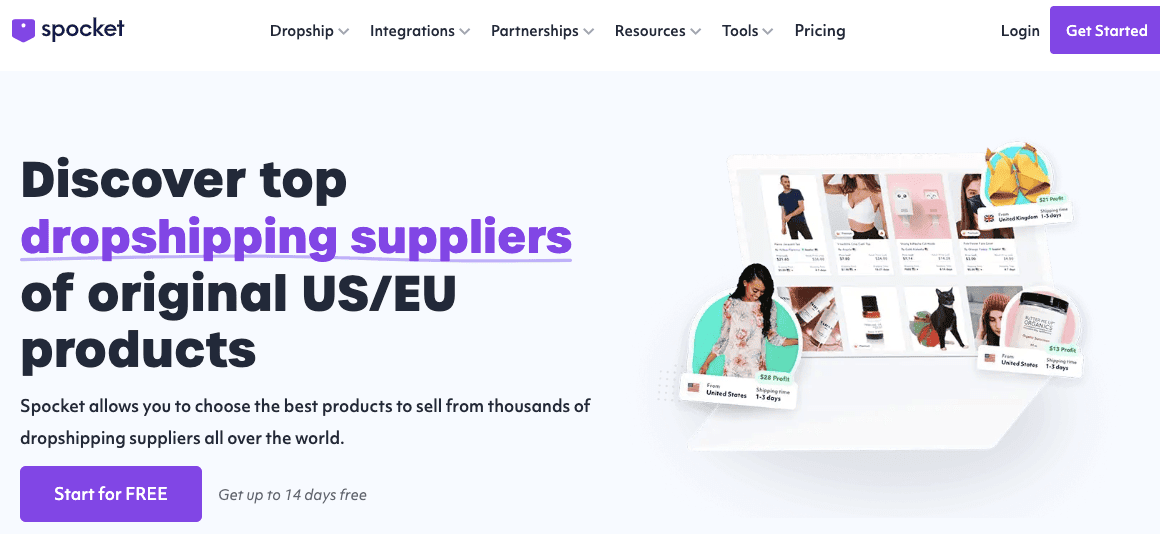
You can also experiment with niche products and slowly test them out with this model. By monitoring real-time customer data, you’ll get a sense of what customers need and adjust your sales accordingly. This allows you to hone in on marketable products and eliminate products that aren’t profitable enough.
2. Print on demand
If you’re an artist, designer, or writer, this eCommerce model could be the right fit for you. Under the Print-on-Demand (POD) model, a product is only created and shipped once a customer places an order. This eliminates the problems of inventory management, stocking products, and upfront costs.
You can leverage the pull of your unique aesthetics and designs to create custom products in a wide variety of niches, such as apparel, home decor, stationery, bags, phone cases, laptop sleeves, and more. This allows for greater flexibility, as customers can customize a design according to their preferences. All aspects, like printing the product and shipping it, come under the purview of your supplier.
Even if you’re not an artist, you can collaborate with the right artists to leverage the print-on-demand model. But remember that design plays a crucial role, so you’ll need to find a way to make your products stand out for them to be successful.
Here, you’ll need to do some market research and figure out your niche and market saturation. It’s truly about aligning your products with what your audience is looking to buy.
Get clear on your target audience by creating buyer personas. Also, ensure that your website, app, and social channels use aesthetics that appeal to this target audience. As you get more reviews, it gets easier to market your products in your niche.
Finally, you must partner with reliable suppliers who guarantee quality products and on-time delivery. Some popular ones include Printify, Printful, Gooten, and Apliiq.

3. Handmade goods shop
If you’re a creative person who makes beautiful products ranging from earrings to handicrafts — this might be your ticket to a successful business venture. Or, as an entrepreneur, it’s about finding the right products and target audience to market the product.

You can reduce your start-up costs by joining a platform like Shopify or Etsy, where you’ll get help creating your logo and setting up your product pages. What are some of the best-selling product niches you can consider? We have a list ready for you.
- Accessories
- Jewelry
- Art and art prints
- Handmade candles
- Skincare products
- Tote bags
- Enamel pins
- Gift baskets
- Subscription boxes
- Traditional handicrafts
- Keychains
- Kitchen utensil holders
- Quilts and crochet goods
Here are some tips to get started with your own handmade goods store:
- Don’t spend hours making a single item. Choose goods that you can make reasonably fast and do your cost analysis.
- Sell on multiple platforms like Etsy, Amazon, Shopify, etc. The advantage is leveraging their pre-existing markets. The cons are limited control over SEO tactics.
- Create excellent product descriptions and high-quality descriptions and videos. Highlight your USP and emphasize quality.
- Ensure your shipping is free. People are more likely to buy a product for $20. They’re less likely to pay $15 and an add-on $5 for shipping.
Read more: Winning in a Competitive World — eCommerce Marketing 101
Service-based online business
If selling handmade products or a print-on-demand store is not your cup of tea, don’t worry. If your strength lies in selling high-quality services, this segment is for you. Here’s how you can profitably launch your services online.
1. Freelance services
Online freelancing is where individuals work as independent contractors who offer their services to clients on a project-by-project basis or based on a contract. The setup costs are minimal. You’re ready to begin if you have some expertise and a Wi-Fi connection.
Skills like social media marketing, web design, data analytics, full stack development, animation, and copywriting are some of the most lucrative and in-demand when it comes to freelancing.
But remember that freelancing is also a competitive market, so you must find ways to stand out. A recent study found that over 1.1 billion people are freelancers worldwide! In the US, the total number of freelancers is expected to go up to 86.5 million by 2027 — that’s roughly half the workforce.
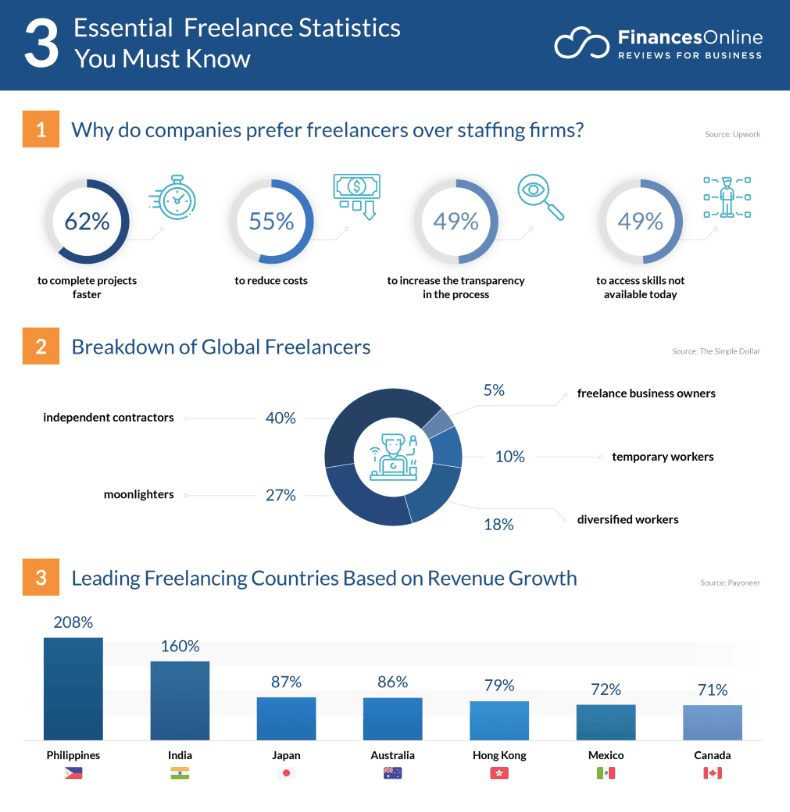
Some of the advantages of freelancing include:
- Remote work and flexibility to travel
- Diverse services and skills in demand
- Building your portfolio and reputation
- Collaboration with several clients
- Flexibility and control over time and payment structure
Of course, you must consider the cons, like irregular payment schedules, filing for self-employment taxes, managing your online business operations, and finding the right clients. Starting a freelancing gig part-time without quitting your job can also be a valid option for beginners.
Read also: Latest Online Shopping Trends and Statistics
2. Virtual assistance
A virtual assistant provides administrative and planning services to clients or companies from a virtual location. As a virtual assistant, you can charge clients based on the hours worked or several tasks handled. Unlike in-person assistants, virtual assistants take on a broader range of tasks like video editing or content creation. Here are some of the common tasks handled by skilled virtual assistants:
- Personal tasks like answering phone calls, scheduling appointments, etc.
- Calendar management and reminders to facilitate better work-life balance for busy clients.
- Providing customer support
- Data entry and management
- Content creation
- Social media marketing and management
- Project management
Your advantage here is a flexible schedule, remote work, working with multiple clients, and leveraging your skill sets. Whether you’re a stay-at-home mom or looking for a side hustle, depending on your skill set, this might make you big bucks.
The industry is expected to grow over the next few years. To begin with, you can sign up with online platforms to find your clients and clock those experience hours.
We also recommend creating a website and a social media presence. Remember to ask clients for feedback and nurture new networks to find more clients across channels. Also, remember to highlight your skills and strengths on all your channels.
Read also: The Ultimate Guide to Selling Digital Goods Online
3. Online coaching and consulting
Another hot industry right now is the online coaching and consulting business. This industry has grown explosively over the past few years, and we expect this trend to continue.
But coaching and consulting are not the same. A coach tries to get answers from their clients by asking the right questions. A consultant, on the other hand, takes a more hands-on approach and gives their clients direct advice on the next course of action.
A consultant can work in any domain, from HR, advertising, personal or corporate finance, marketing, IT, education, and legal.
Coaches can also work across a range of domains, such as performance or skill coaching, career, personal life, business, relationships, nutrition, parenting, and even spiritual coaching.
The key difference is that a coach must be a good listener and guide their clients with expertise. Some of the key benefits of an online coaching business include low start up costs, low overheads, flexibility, global audience, and freedom to work anywhere.

Here’s how to get started:
- Start by choosing your modality (video calls, group classes, online courses) and registering your website. Essentially, you’re selling your expertise, so leverage all possible channels.
- Understand your target audience and their pain points. Create a clear strategy to solve these pain points and highlight what makes you unique. At this stage, analyze your competitors and create a pricing plan.
- Set clear and measurable outcomes for your clients from the outset. Be transparent with your process and outcomes.
- Test your niche with a small set of clients, resist the urge to diversify too soon, collect feedback and success stories, and slowly scale your business over the years.
- Be consistent with your branding across channels.
Read more: 19 eCommerce Best Practices to Win Customer Confidence
Content creation and digital marketing
If your strength lies in content creation or digital marketing, here are some excellent online business ideas to explore.
1. Blogging
Starting a blog and building a portfolio of relatable and engaging blogs can be a highly lucrative venture in 2025. There is a genuine demand for quality content across niches and industries, and you might be able to capitalize on the rising demand. Here are some key statistics.
Begin by identifying your niche in the blogging industry. This could be anything ranging from personal finance advice to DIY craft ideas to fitness to sustainable travel. Play to your strengths. Once this is done, follow these steps to start your blog.
- Conduct some research on the top players and writers in your niche. Do some basic analytics. What makes their content stand out? Identify specific gaps you can fill regarding ideas, writing style, and target audience.
- Develop your content strategy by listing the major topics you want to write on. Then, create a mix of the types of blogs (listicles, comprehensive guides, how-to guides, etc.) you want to create.
- Develop your content calendar. This includes the frequency at which you plan to post blogs. Break it down into smaller, achievable goals for each week, month, quarter, and year.
- Create your website using tools like WordPress or a popular platform like Wix. Your brand messaging needs to be consistent. Use high-quality images and catchy copy to grab attention.
- Optimize your website and your blog content for SEO. Conduct a simple keyword density research in your niche to integrate them.
- Regularly monitor data like organic search, time spent on a page, etc., to innovate your blog strategy.
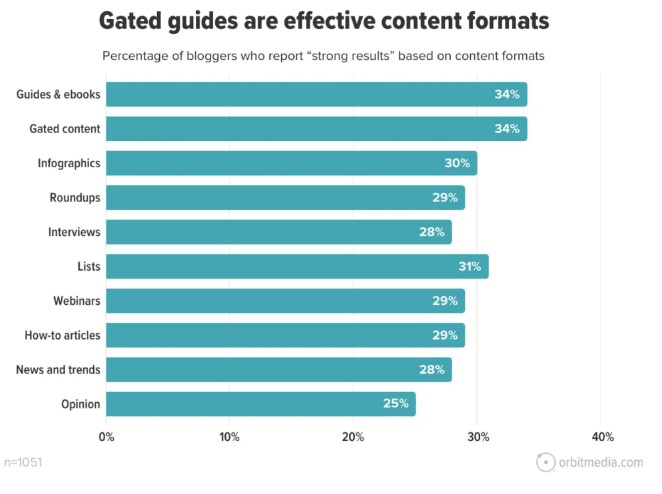
2. YouTube channels
If the written word is not your only strength, then running a YouTube channel might be the online business idea to take off for you. You might feel your best while articulating your thoughts in front of a camera to engage your audience.
YouTube is a versatile platform to leverage your passions into a profitable business venture. There is increasing demand for YouTube content on niches ranging from cooking and travel vlogs to philosophy and tech reviews!
Here are some tips to launch a YouTube channel and grow it, including the equipment you’ll need:
- Once you’ve found your lucrative niche, invest in quality DSLR or mirrorless cameras like Canon EOS Rebel T7i. Or, a compact camera will do when you’re beginning. Consider investing in a Lavalier (Lapel) microphone if you’re speaking or USB Condenser microphones if you’re doing voiceovers.
- You can also consider purchasing a tripod or stabilizer and professional editing software like Adobe Premier Pro. Of course, you can also stick to free options like DaVinci Resolve depending on your budget.
- Use tools like VidIQ or TubeBuddy for keyword research and ensure that your video titles and descriptions are SEO optimized.
- Write out your scripts in the most engaging way possible and edit the video. Even if you’re starting with your smartphone camera, good lighting and sound are essential. Ensure that your thumbnails are eye-catching.
- Leverage YouTube features like end screens and cards to promote related videos. Create a few playlists for your audience, as it gives you visibility. Engage in YouTube communities regularly and post related content and polls.
- Monitor YouTube analytics and focus on watch time. This will give you a sense of when users tend to lose interest and then re-work your narrative strategy.
Read also: How to Start Your Home Business Successfully in 2025
3. Podcasting
Did you know that the average podcast listener spends roughly 7 hours weekly on their favorite podcasters? Unlike a YouTube video, people can listen to their beloved podcasts while driving to work or on the treadmill at the gym! So, why would you want to miss out on this lucrative opportunity to launch your podcast?
A podcast creates a much closer bond, especially on niche topics you’re passionate about. It’s got much less of a start-up cost than YouTube. All you need is a quality microphone and content, and you’re ready to go!
If your podcast does well enough, you may find affiliates wanting to market their products on it. Remember to invite special guests or experts to grow your audience and keep them engaged. Typically, a podcast of 20-40 minutes in length tends to perform the best.
You can also boost profitability by using monetization strategies like sponsorships, exclusive merchandise, affiliate marketing, crowdfunding, and subscription-only premium content. But first, focus on your content and reaching your target audience before expanding your monetization strategies.
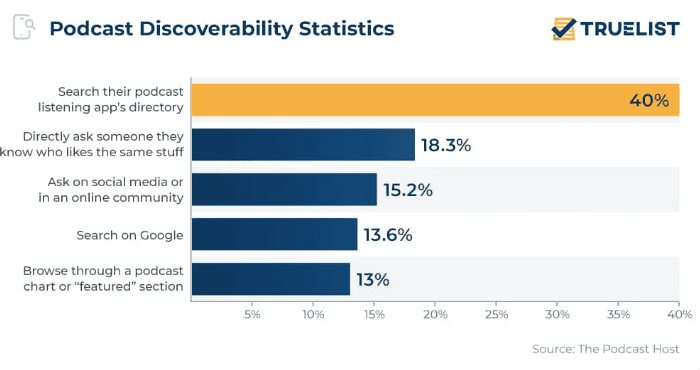
Read also: Top eCommerce Business Ideas for Aspiring Entrepreneurs [2025]
Innovative and Emerging Online Business Ideas
The online business arena is constantly evolving as many businesses compete for visibility and profitability. Here are some exciting trends to watch out for and integrate into your online business venture.
AI-powered tools and services
Artificial Intelligence (AI) has completely transformed how online businesses create and distribute content. These AI tools leverage machine learning and Neural Language Processing (NLP) to automate and enhance content creation and design. Some of the benefits of AI-powered tools include operational cost reduction, better decision-making, avoiding human errors, and boosting productivity. Here’s a summary.
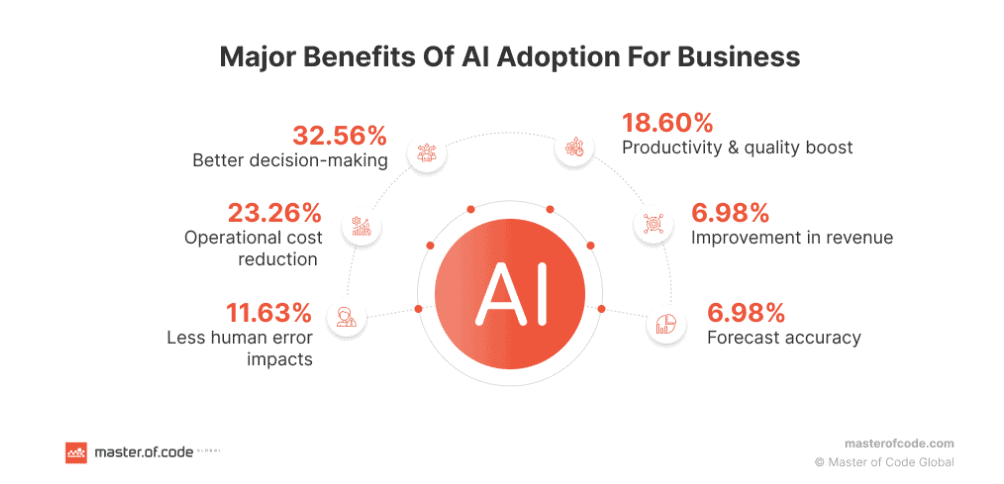
Some areas in which you can leverage the power of AI are as follows.
- Content creation and keyword research: AI tools like Jasper.ai and Copy.ai can generate various content types, such as blogs, scripts, website copy, and more. They can tailor content to your preferred tone and marketing objectives to boost productivity and creativity. Apps like BuzzSumo offer AI-powered keyword research tools for content optimization, SEO strategy, and suggesting topics for your blogs.
- Graphic design and video editing: AI-powered tools make it easy to transform a blog post into a video in minutes. Apps like Magisto automate video editing and graphic design.
- Social media scheduling and management: AI-driven insights can help you optimize your social media marketing strategies and scheduling in a fraction of the time. It helps to optimize your social media posts at the right time and analyze engagement metrics in real-time to maximize your reach.
- Personalization and customization: AI platforms like Drift can enhance customer interactions and services to capture more leads and improve the overall customer experience.
In 2025, AI will offer avenues for online businesses to enhance productivity, creativity, and scalability and thus increase profitability.
Read also: How to Sell on Etsy in 7 Easy Steps (2025)
AR/VR content and services
Augmented Reality (AR) and Virtual Reality (VR) have become a huge trend in 2025. This trend is here to stay, especially after Apple’s VR (VisionPro) launch in 2025.
AR uses a digital camera or smartphone to augment your surroundings by adding digital elements. Here, the digital world blends into your perception of the natural world to create an exciting experience for the viewer. Remember the popular game Pokemon Go? That’s a great example of AR success.
VR is a simulated experience where a head-mounted display lets users completely immerse themselves in a virtual reality. VR has now emerged as a revolutionary player in the gaming and entertainment industry. But, it is also slowly revolutionizing the education and business industry.
For instance, VR can help companies launch a virtual demo where prospects can try out their products. It promotes asynchronous learning and training and an immersive learning experience in the education and business sectors.
Brands like Nike have already launched VR-augmented apps that allow users to try out their products virtually. Ikea has also launched an app that allows users to test how a product looks inside their home using AR.

Ethical and sustainable products
Yet another exciting trend for online businesses in 2025 is the increased value of ethical and sustainable products. The trend of ethical consumerism is on the rise, especially among the younger generations. Recent studies indicate that 50% of Gen-Z and 41% of millennials are more likely to buy from brands that support social causes.

Small online businesses can leverage this trend by ethically sourcing their materials, paying fair wages to suppliers and workers, and upcycling or repurposing discarded materials into something valuable and creative. Consumers were willing to spend up to 5% more for an ethical product.
You can also integrate this trend into your online business by making it a part of your branding story. Reiterate your commitment to transparency and sustainability by educating your customers about it. Trust us, they are likely to appreciate your efforts.
Conclusion
Online businesses have emerged as one of the most significant developments in recent years. Over 35% of consumers say they would rather shop for products and services online, a trend emerging across developed and developing countries.
We hope some of our top online business ideas inspire you to start a profitable venture of your own. This can be done with relatively smaller budgets.
Today, we stand on the precipice of an era where physical boundaries don’t limit your entrepreneurial creativity. What better time to leverage your skills and embrace each challenge as an opportunity for growth? As an entrepreneur, it is your vision to dare to dream big but start with a small step.
What are you waiting for?
Let us know which ideas resonated with you in the comments below!
FAQ
What are the best online business ideas for beginners?
Some of the best online business ideas for beginners are:
- Dropshipping
- Print on demand
- Handmade goods shop
- Freelance services
- Virtual assistance
- Online coaching and consulting
- Blogging
- YouTube channel
- Podcasting
How much investment is needed to start an online business?
The investment needed to start an online business depends on the business you plan to start. Setting up a small online business service for around $500-$1000 is possible. The key is to accurately estimate the costs you’ll incur for the first few months. Here are some of the costs you’re likely to incur:
- Incorporation fees: $100-$800
- Domain name and web hosting: $20-$100 per month
- eCommerce software: $0-$300 per month
- Variable shipping costs
- Insurance: $300-1000 per year
The estimates can range from $3000 to $10,000 per year on the lower end and between $30,000 and $100,000 on the highest end.
Which online business models offer the highest profit margins?
Generally, most eCommerce business models offer the highest profit margins. Some of the most profitable online business models include:
- Dropshipping model
- Crowdsourcing model
- D2C (Direct-to-Consumer) model
- Affiliate model
- Freemium model
How can I find reliable suppliers for my online store?
Finding a reliable supplier for your online is easy if you follow these steps:
- Identify your online business’s needs and limitations, such as your budget for shipping, quality standards, and whether you prefer a local or global supplier.
- Then, do your research on successful suppliers in your niche. Ask your professional circle for recommendations and referrals. Search for suppliers in your industry through the North American Industry Classification System (NAICS).
- Verify the suppliers’ credentials, such as business licenses and reviews. Ideally, you should visit their factory or manufacturing hub or assign a third party to do so.
- Negotiate your requirements, payment terms, and estimated delivery times. Ideally, this step will satisfy both you and the supplier.
- Place a sample order or a few small orders. This will ensure you’ll get to test whether they keep their promises and ensure quality control.
What are the common challenges faced by online business owners?
Some of the key challenges faced by online business owners include:
- Customer acquisition and retention
- Intense competition and market saturation
- Website management and cybersecurity threats
- Effective payment processing and fraudulent transaction prevention
You can face these challenges head-on by:
- Creating a clear content and digital marketing strategy aligned with overall goals and budget.
- Focus on your market niche and your company’s unique competencies. Stay updated with the latest trends and technologies.
- Invest in top-notch technology to streamline supply management and financial transactions
- Build strong, long-term relationships with customers, suppliers, and business partners.
How do I effectively market my online business?
Follow these simple steps to market your online business:
- Develop a cohesive brand identity with the right content and digital marketing strategy. Optimize your store website with SEO and optimum user experience (UX).
- Invest in timely marketing campaigns across channels like blogs, social media, and email marketing.
- Consider investing in pay-per-click marketing and retargeting ads to retain the audience.
- Create an affiliate marketing program or launch a subscription program to boost customer retention.
- Create online communities for customers and loyal customers. Ensure smooth working relationships with various stakeholders, such as suppliers and business partners.
- Invest in the right tools and technologies for your online business.
What tools and platforms are essential for running an online business?
There are several essential tools and platforms for running a successful online business. Here are a few.
- SEO tools: Google Analytics, SEMRush, Ahrefs
- Email marketing: Mailchimp, ActiveCampaign, EngageBay all-in-one CRM
- Social media marketing: Hootsuite, Sprout Social
- eCommerce platforms: Shopify, BigCommerce, WooCommerce
